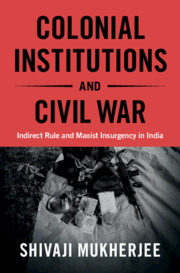Book contents
- Colonial Institutions and Civil War
- Cambridge Studies in Contentious Politics
- Colonial Institutions and Civil War
- Copyright page
- Contents
- Figures
- Tables
- Acknowledgments
- Part I Theory
- Part II Qualitative and Quantitative Testing
- Part III Generalizability
- 9 Explaining Partial Success of Maoists in Kerala and Karnataka
- 10 Frontiers of Empire: Indirect Rule and Insurgency in Burma and Pakistan
- 11 Conclusion: Policy Implications and Future of the Maoist Conflict
- Bibliography
- Index
- Series page
9 - Explaining Partial Success of Maoists in Kerala and Karnataka
from Part III - Generalizability
Published online by Cambridge University Press: 15 May 2021
- Colonial Institutions and Civil War
- Cambridge Studies in Contentious Politics
- Colonial Institutions and Civil War
- Copyright page
- Contents
- Figures
- Tables
- Acknowledgments
- Part I Theory
- Part II Qualitative and Quantitative Testing
- Part III Generalizability
- 9 Explaining Partial Success of Maoists in Kerala and Karnataka
- 10 Frontiers of Empire: Indirect Rule and Insurgency in Burma and Pakistan
- 11 Conclusion: Policy Implications and Future of the Maoist Conflict
- Bibliography
- Index
- Series page
Summary
Why were Maoists not as successful in certain states within India with former princely states and zamindari tenure? Examples are Kerala formed out of princely states Cochin and Travancore and Malabar district with zamindari land tenure, and also Karnataka, which includes the former princely state of Mysore. What explains these exceptional cases? Qualitative analysis using historical data shows that these are not really exceptions but rather influential cases where “apparent deviations from the norm are not really deviant, or do not challenge the core of the theory, once the circumstances of the special case or cases are fully understood.” To explain these influential cases, I use the typology of different types of princely states from Chapter 6 and demonstrate that Kerala and Karnataka had warrior or challenger states like Mysore or Travancore that resulted in higher levels of centralization and state capacity and less land inequality than the feudatory/tributary princely states in Chhattisgarh or the successor state of Hyderabad in Andhra Pradesh discussed in earlier chapters. A second reason the Maoists have not been as successful in Kerala and Karnataka was that land inequality was reversed due to progressive postcolonial political parties enacting land reforms.
Keywords
- Type
- Chapter
- Information
- Colonial Institutions and Civil WarIndirect Rule and Maoist Insurgency in India, pp. 301 - 323Publisher: Cambridge University PressPrint publication year: 2021



